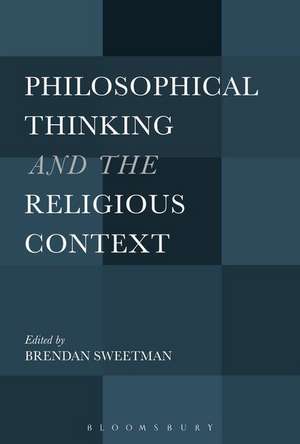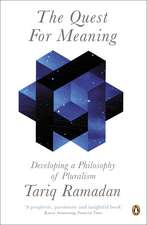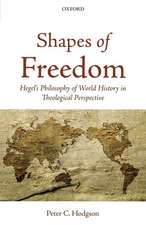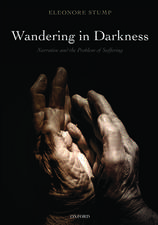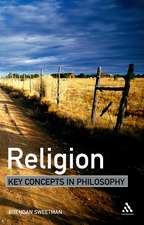Philosophical Thinking and the Religious Context
Editat de Dr Brendan Sweetmanen Limba Engleză Paperback – 22 apr 2015
| Toate formatele și edițiile | Preț | Express |
|---|---|---|
| Paperback (1) | 256.20 lei 6-8 săpt. | |
| Bloomsbury Publishing – 22 apr 2015 | 256.20 lei 6-8 săpt. | |
| Hardback (1) | 714.51 lei 6-8 săpt. | |
| Bloomsbury Publishing – 18 dec 2013 | 714.51 lei 6-8 săpt. |
Preț: 256.20 lei
Preț vechi: 294.74 lei
-13% Nou
Puncte Express: 384
Preț estimativ în valută:
49.02€ • 53.42$ • 41.31£
49.02€ • 53.42$ • 41.31£
Carte tipărită la comandă
Livrare economică 24 aprilie-08 mai
Preluare comenzi: 021 569.72.76
Specificații
ISBN-13: 9781501307683
ISBN-10: 1501307681
Pagini: 224
Dimensiuni: 152 x 229 x 25 mm
Greutate: 0.3 kg
Editura: Bloomsbury Publishing
Colecția Bloomsbury Academic
Locul publicării:New York, United States
ISBN-10: 1501307681
Pagini: 224
Dimensiuni: 152 x 229 x 25 mm
Greutate: 0.3 kg
Editura: Bloomsbury Publishing
Colecția Bloomsbury Academic
Locul publicării:New York, United States
Caracteristici
Examines core topics: the nature of God; science and religion; ethics
Notă biografică
Brendan Sweetman is Professor of Philosophy at Rockhurst University, USA. He is author and editor of ten books, including Religion and Science: An Introduction (2010) and Religion: Key Concepts in Philosophy (2007).
Cuprins
Preface, Brendan Sweetman Part 1: Approaches to God 1. Remembering Identity: Exploring the Possibility of a Process Anthropology, Fr Ferdinand Santos 2. Stengers on Whitehead on God, Daniel Dombrowski 3. Thinking about the God of John Macquarrie, Owen CummingsPart II: Science, Evolution and God 4. Teleology, John B. Cobb 5. The Darker Side of Twenty First Century Science, and a Perspective from a Founding Father: Robert Boyle, Jim Malone6. Evolution and the Goodness of God: A Hartshornean Perspective, Donald Viney 7. Does the theory of evolution make the problem of evil worse? Brendan Sweetman Part III: Philosophy of Religion and Ethics 8. Hyperbolic Thought: On Creation and Nothing, William Desmond 9. The Heart's Road to God: a Franciscan via pulcritudinis, Sr. Mary E. Ingham 10. Carnap's distinction and the God-question, Fr James Murphy 11. A Different Mode of Encounter: Walzer's Egalitarian Liberalism and the Christian Tradition, Linda Hogan Postscript 12. Philosophizing and Philosophy: Reflections on the Source and Resource of a Quest, Santiago Sia List of Contributors Index
Recenzii
This collection of essays in honour of Santiago Sia is deeply rooted in the process thought of Charles Hartshorne and A. N. Whitehead. With contributors of the highest distinction, the essays are exercises in the philosophy of religion that are yet genuinely interdisciplinary, contextualizing philosophical thinking in areas that include ethics, theology, science, political theory, and the problem of suffering. They are outstanding examples of how to think with more than the intellect but also with vision and imagination and with a clear sense of the context of all thought in the demands of reality and the immediate world. The book provides a brilliant testimony to the career and commitment of Professor Sia as educator and thinker.
Brendan Sweetman's Philosophical Thinking and the Religious Context adds to his already-established reputation in Anglo-American philosophy of religion. Drawing largely on the contributions of process philosophy, the range and depth of the essays collected in this volume make it a worthy addition to personal as well as academic libraries. Scholars and students alike will benefit from the insightfulness, clarity, and rigor of essays that engage a number of key questions in contemporary philosophical reflection on religion and religious belief.
Publications on the philosophy of Charles Hartshorne are rather rare these days. However, the broad scope of the contributions in this volume, by authors from all over the globe, attests to both its liveliness and its fruitfulness, in almost all philosophical disciplines.
A. N. Whitehead and Charles Hartshorne were towering figures in philosophy and theology at a time when the two disciplines were widely thought to be irreconcilable. Their labors on behalf of reconciliation issued in the immensely influential perspective of process theism. This volume demonstrates that its influence and debate with classical theism continue unabated. Sweetman has assembled a remarkably balanced collection of essays given the range of issues addressed and the unique creativity of each author. Readers do well to understand the current application of process thought to areas where reflection matters most, including especially the relation between science and religion and the special challenge of the problem of evil.
Brendan Sweetman's Philosophical Thinking and the Religious Context adds to his already-established reputation in Anglo-American philosophy of religion. Drawing largely on the contributions of process philosophy, the range and depth of the essays collected in this volume make it a worthy addition to personal as well as academic libraries. Scholars and students alike will benefit from the insightfulness, clarity, and rigor of essays that engage a number of key questions in contemporary philosophical reflection on religion and religious belief.
Publications on the philosophy of Charles Hartshorne are rather rare these days. However, the broad scope of the contributions in this volume, by authors from all over the globe, attests to both its liveliness and its fruitfulness, in almost all philosophical disciplines.
A. N. Whitehead and Charles Hartshorne were towering figures in philosophy and theology at a time when the two disciplines were widely thought to be irreconcilable. Their labors on behalf of reconciliation issued in the immensely influential perspective of process theism. This volume demonstrates that its influence and debate with classical theism continue unabated. Sweetman has assembled a remarkably balanced collection of essays given the range of issues addressed and the unique creativity of each author. Readers do well to understand the current application of process thought to areas where reflection matters most, including especially the relation between science and religion and the special challenge of the problem of evil.
